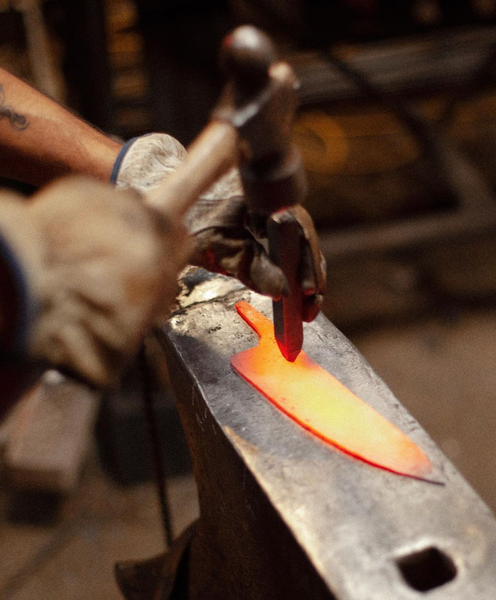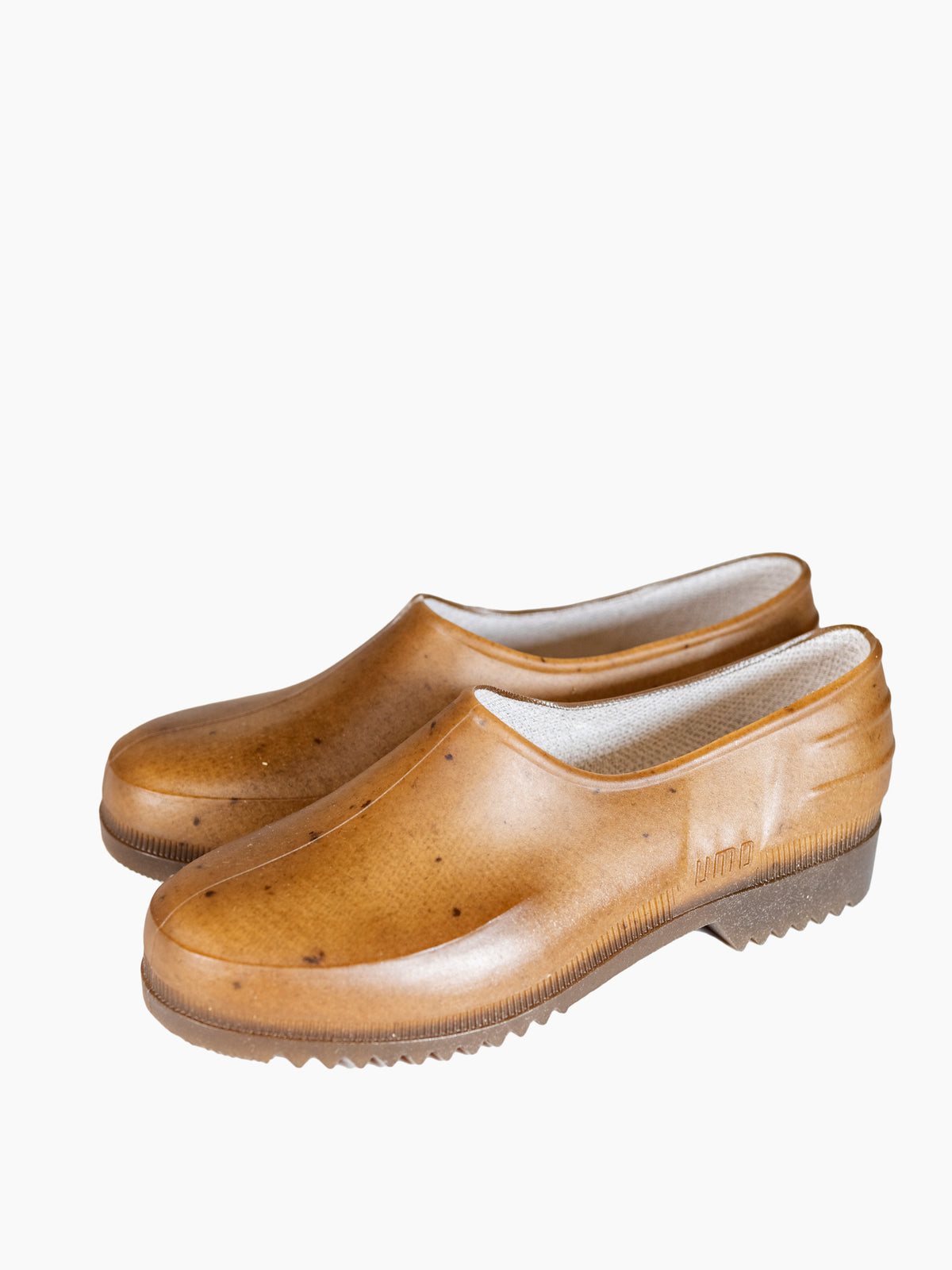

TPS: There is so much to you which we adore. Your work as a blacksmith is more than just knife making. Can you speak to us about the goals that Soma Metalwork encompasses in the world and how you wish to exist in, and model, a change for traditional blacksmithing?
KC: I adore you all too! Firstly, the simple truth is that the primary goal of my work is that it allows me to live a life that I enjoy waking up to. I am so lucky that I was able to realize relatively early in my life that using my hands on a daily basis and problem solving in a spatial and tactile way were crucial aspects of my sense of self. I go to sleep each night thinking about forging and constructing a blade or all of the stages of building a house.
Before even getting into the goals of Soma Metalwork, I think it’s crucial to acknowledge that my personal political beliefs and the positionality of my business are inseparable. There's this American obsession with saying “stop bringing politics into things,” which I view as a combination of cowardice and deliberate insidiousness. Feigning political neutrality serves as a convenient shield for big businesses to evade accountability while normalizing the economic benefits derived from maintaining oppression.
That said, my overarching goals for Soma Metalwork are twofold: to craft beautiful objects that bring both aesthetic pleasure and practical utility, and to share the joy of blacksmithing with a diverse audience. Achieving these goals necessitates transparency about my political stance, resilience against critiques of such transparency as unprofessional, and a continuous examination of the barriers to entry that I perpetuate. Last year, half of my blacksmithing students were non-male, spanning ages from five to 76. This Spring, I'm excited to offer BIPOC blacksmithing classes in collaboration with Tender Table’s Radical Nourishment series. When I’m in my shop, I try to limit manual labor to 25 hours per week, ensuring I'm gentle and kind to my body. Rejecting the notion of separating "politics" from "business," I recognize that my work is deeply intertwined with my values and sense of self; without this connection, my work would lose its purpose and meaning.
The sacrifices made by many to uphold the status quo in blue-collar work are remarkable. Despite the toll on their bodies and well-being, some prioritize preserving existing power structures over supporting liberation and collective empowerment. While systemic oppression is pervasive, individuals still wield significant influence within their industries. Promoting accessibility and self-awareness isn't a sacrifice—it's a step toward creating safe, inclusive work environments where everyone benefits except those profiting from labor exploitation. That’s sort of the basis of my work and I have a long way to go.

TPS: Now onto details of your creations, can you tell us what sets apart your handmade metal goods from form and function to how they are made and the materials that you source?
KC: I learned my craft through a two-year tenure at Wick’s Forge, learning a variety of blacksmithing techniques. What sets my handmade metal goods apart is the fusion of traditional blacksmithing with an elevated aesthetic that reflects the type of goods I want in my home. While I draw inspiration from tradition, my creations aren't overtly rustic; instead, they try to blend sleek functionality with timeless craftspersonship.
Central to my approach is a commitment to keeping my work small and intimate, ensuring that each piece receives the personal attention it deserves. Before adding a new product to my lineup, I spend a lot of time prototyping, refining both its aesthetic and functional aspects. It's essential for me to ensure that every piece not only meets my standards as a finished product, but also brings me joy to make. When I’m in my shop, I am happy and my needs are met and I think it’s worth acknowledging that this is a huge asset to the emotional value of a manufactured object. When you buy a Soma Metalwork product, you’re supporting a craftsperson who treats themself fairly and is probably singing while they forge you a coffee scoop.
The fabrication techniques for each of my products varies. Often I start with a raw bar of steel for hooks, knives, and spoons. In some instances, I utilize laser cutting for particularly complex elements such as the tines on a fork, complementing the hand- forged integrity of the piece. I try to be conscious of the materials I source; my wooden handles are crafted from offcuts or seconds that aren't suitable for larger woodworking projects. Eventually I would like to be producing my own steel alloys, but that is a rigorous craft in and of itself. To be honest, greenwashing my work isn’t high on the list of my priorities and I derive a greater sense of sustainability from creating an inclusive space and enjoying my work than trying to brand myself as environmentally friendly (which I don’t think any business can achieve under capitalism).

TPS: Tell us about how Maine as a place inspires or supports your work and about the community that you support and are supported by.
KC: Ah, Maine! I moved here six years ago from my lifelong home of Harlem, NYC for what was supposed to be a nine-month boatbuilding apprenticeship. I quickly saw a type of self-sufficiency that I realized I had been deeply missing. I saw neighbors coming together to shingle a barn and friends who would help me take my car apart to figure out how to fix it. The man who first taught me blacksmithing, Trey, also showed me the best spot to harvest oysters and how to shoot and maintain bolt-action rifles. I knew that I would forever feel unfulfilled if I didn’t dedicate myself to learning new skills and making and repairing the objects I rely on.
Everyone who has taken my classes and bought my work is keeping me afloat, and I’m deeply grateful to each of them. The support from friends, lovers, and family has been invaluable, and I find constant inspiration in the diverse array of makers and small craft businesses in this area. Yet, amidst this gratitude and inspiration, I grapple with a sense of guilt and anger. It's impossible to ignore the irony of living in a state that celebrates its relationship to land, food, and craft while being complicit in the dispossession of Indigenous communities, both historically and presently. The imperialist and capitalist frameworks that have shaped our society have inflicted harm on the land we inhabit and have commodified our relationships with everything, from shelter to love.
While acknowledging this sobering reality, I find solace in the resilience and resistance of communities striving for justice and equity, and am inspired by the number of radically - minded small businesses around me. It's a reminder of the complexities inherent in our reality and the ongoing work needed to create a world where everyone's needs are met. Every endeavor towards inclusivity and every step towards dismantling oppressive systems brings us closer to that vision of a more just and equitable society.




